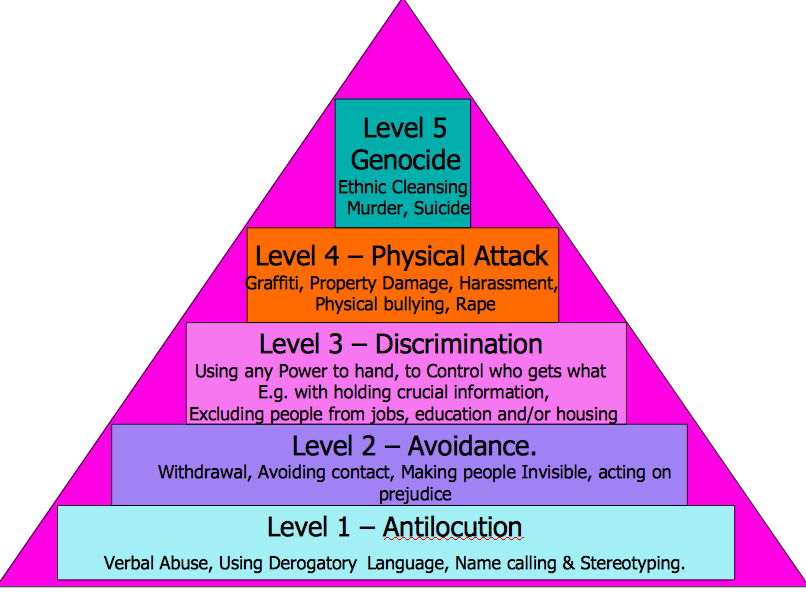The power of language

This week the President of the United States said, “We have people coming into the country, or trying to come in–and we’re stopping a lot of them–but we’re taking people out of the country. You wouldn’t believe how bad these people are. These aren’t people. These are animals,” during a California Sanctuary State Roundtable at the White House.
This is not the first time Trump has dehumanized immigrants (and other groups) and it won’t be the last.
We need only look at the long history of dehumanization against groups of people as a prelude to violence against them to understand how to place his comments in their dangerous context.
As author Anne Applebaum said on Twitter, “Stalin, Mao, Hitler and Pol Pot all called their opponents ‘parasites’ or ‘vermin’ or ‘animals.’ Dehumanization is what you do to unwanted social groups before killing them.”
As noted on NPR, during the Holocaust, Nazis referred to Jews as rats. Hutus involved in the Rwanda genocide called Tutsis cockroaches. Slave owners throughout history considered slaves subhuman animals. In Less Than Human, David Livingstone Smith argues that it’s important to define and describe dehumanization, because it’s what opens the door for cruelty and genocide.
“When people dehumanize others, they actually conceive of them as subhuman creatures,” says Smith. Only then can the process “liberate aggression and exclude the target of aggression from the moral community.”
It is also important to look again at Gordon Allport’s work on the Stages of Prejudice in light of Trump’s recent statement. In Allport’s research, he recognized that the first stage of prejudice is jokes and slurs–using language to dehumanize, for example, as Trump consistently does.
The response to jokes and slurs is often that they are harmless, and that we are overreacting, but in Allport’s model, they are the foundation for the next stages of prejudice, which include avoidance, discrimination, violence, and genocide.
Language matters. Jokes and slurs are not harmless. They are, instead, a seed.
NEXT ONLINE RACISM CLASS STARTS MAY 22
Over the past three years, The Hard Conversations: Intro to Racism class has educated over 11,000 people about structural racism, white privilege, white fragility, the myth of colorblindness, and how to be an effective ally.
The next cohort begins May 22, with our online, asynchronous classroom opening on that date. The live calls for the cohort begin the following week, and are scheduled from 8-9:15pm Eastern on May 29, June 5, June 12, and June 19. Go here for more information and to register. Groups of 10+ receive a registration discount. Email support@pattidigh.com for more information.
EDUCATE YOURSELF
You may find these two articles to be of interest:
This provocative article from Ta-Nehisi Coates is worth a read: I’m Not Black, I’m Kanye.
“…what happened to America in 2016 has long been happening in America, before there was an America, when the first Carib was bayoneted and the first African delivered up in chains. It is hard to express the depth of the emergency without bowing to the myth of past American unity, when in fact American unity has always been the unity of conquistadors and colonizers—unity premised on Indian killings, land grabs, noble internments, and the gallant General Lee. Here is a country that specializes in defining its own deviancy down so that the criminal, the immoral, and the absurd become the baseline, so that even now, amidst the long tragedy and this lately disaster, the guardians of truth rally to the liar’s flag.”
Modern-day Redlining: The focus of A House You Can Buy But Never Own is how rent-to-own companies target African Americans, making home ownership a pipe dream for many.
“…according to some housing advocates, these arrangements are in some ways even more predatory than the ones of half a century ago, even after decades of laws and regulations enacted to prevent racial discrimination in the housing market. ‘It was bad in the mid-20th century, but it is even worse now,’ said Beryl Satter, a history professor at Rutgers University–Newark who wrote Family Properties, a book on the history of predatory lending in Chicago, about contract-for-deed arrangements. ‘The housing is in way worse shape, the markups are grotesque, and these people have been through multiple forms of credit exploitation, which is partially why they’re in this market.’’
We have much to do. Take care of yourself out there so you can continue the work.






